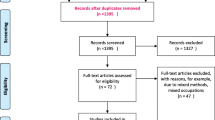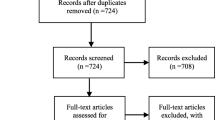Abstract
An important part of learning processes in the professional development of counselors is the integration of declarative knowledge and professional experience. It was investigated in-how-far mental health counselors at different levels of expertise (experts, intermediates, novices) differ in their availability of experience-based knowledge structures. Participants were prompted with 20 client problems. They had to explain those problems, the explanations were analyzed using think-aloud protocols. The results show that experts’ knowledge is organized in script-like structures that integrate declarative knowledge and professional experience and help experts in accessing relevant information about cases. Novices revealed less integrated knowledge structures. It is concluded that knowledge restructuring and illness script formation are crucial parts of the professional learning of counselors.
Similar content being viewed by others
References
Ackerman, P. L. (1992). Predicting individual differences in complex skill acquisition: Dynamics of ability determinants. Journal of Applied Psychology, 77, 598–614.
Ahn, W., Proctor, C. C., & Flanagan, E. H. (2009). Mental health clinicians’ beliefs about the biological, psychological, and environmental bases of mental disorders. Cognitive Science, 33, 147–182.
Boshuizen, H. P. A. (2003). Expertise development: How to bridge the gap between school and work. In H. P. A. Boshuizen (Ed.), Expertise development: The transition between school and work (pp. 7–38). Heerlen: Open Universiteit of the Netherlands.
Caspar, F., Berger, T., & Hautle, I. (2004). The right view of your patient: A computer assisted, individualized module for psychotherapy training. Psychotherapy: Theory, Research, Practice, Training, 41, 125–135.
Charlin, B., Boshuizen, H. P. A., Custers, E. J., & Feltovich, P. J. (2007). Scripts and clinical reasoning. Medical Education, 41, 1178–1184.
Crits-Christoph, P., Cooper, A., & Luborsky, L. (1988). The accuracy of therapists’ interpretations and the outcome of dynamic psychotherapy. Journal of Consulting and Clinical Psychology, 56, 490–495.
Custers, E. J. F. M., Boshuizen, H. P. A., & Schmidt, H. G. (1998). The role of illness scripts in the development of medical diagnostic expertise: Results from an interview study. Cognition and Instruction, 16, 367–398.
Dawes, R. R. (1994). House of cards: Psychology and psychotherapy built on myth. New York: Free Press.
Dore, K. L., Brooks, L. R., Norman, G. R., & Weaver, B. (2012). Influence of familiar features on diagnosis: Instantiated features in an applied setting. Journal of Experimental Psychology Applied, 18, 109–125.
Duys, D. K., & Hedstrom, S. M. (2000). Basic counselor skills training and counselor cognitive complexity. Counselor Education and Supervision, 40, 8–18.
Eells, T. D., Kendjelic, E. M., & Lucas, C. P. (1998). What’s in a case formulation? Development and use of a content coding manual. The Journal of Psychotherapy Practice and Research, 7, 144–153.
Eells, T. D., Lombart, K. G., Kendjelic, E. M., Turner, L. C., & Lucas, C. P. (2005). The quality of psychotherapy case formulations: A comparison of expert, experienced, and novice cognitive-behavioral and psychodynamic therapists. Journal of Consulting and Clinical Psychology, 73, 579–589.
Eells, T. D., Lombart, K. G., Salsman, N., Kendjelic, E. M., Schneiderman, C. T., & Lucas, C. (2011). Expert reasoning in psychotherapy case formulation. Psychotherapy Research, 21, 385–399.
Eva, K. W. (2005). What every teacher needs to know about clinical reasoning. Medical Education, 39, 98–106.
Feltovich, P. J., Barrows, H. S. (1984). Issues of generality in medical problem solving. In H. G. De Volder, M. C. Schmidt (Eds.), Tutorials in problem-based learning: A new direction in teaching the health professions (pp. 128–142). Assen, The Netherlands: Van Gorcum.
Fong, M. L., Borders, L. D., Ethington, C. A., & Pitts, J. H. (1997). Becoming a counselor: A longitudinal study of student cognitive development. Counselor Education and Supervision, 37, 100–114.
Granello, D. H. (2000). Encouraging the cognitive development of supervisees: Using Bloom’s taxonomy in supervision. Counselor Education and Supervision, 40, 31–46.
Groenier, M., Beerthuis, V. R. J., Pieters, J. M., Witteman, C. L. M., & Swinkels, J. (2011). Psychologists’ diagnostic processes during a diagnostic interview. Psychology, 2, 917–924.
Kendjelic, E. M., & Eells, T. D. (2007). Generic psychotherapy case formulation training improves formulation quality. Psychotherapy: Theory, Research, Practice, Training, 44, 66–77.
Ladany, N., Marotta, S., & Muse-Burke, J. L. (2001). Counselor experience related to complexity of case conceptualization and supervision preference. Counselor Education and Supervision, 40, 203–219.
Lichtenberg, J. W. (1997). Expertise in counseling psychology: A concept in search of support. Educational Psychology Review, 9, 221–238.
Marsh, J. K., & Ahn, W.-K. (2012). Memory for patient information as a function of experience in mental health. Applied Cognitive Psychology, 26, 462–474.
Martin, J., Slemon, A., Hiebert, B., Hallberg, E. T., & Cummings, A. L. (1989). Conceptualizations of novice and experienced counselors. Journal of Counselling Psychology, 36, 395–400.
Murphy, G. L., & Wright, J. C. (1984). Changes in conceptual structure with expertise: Differences between real-world experts and novices. Journal of Experimental Psychology, 10, 144–155.
Norman, G. R., & Brooks, L. E. (1997). The non-analytical basis of clinical reasoning. Advances in Health Sciences Education, 2, 173–184.
Ronnestad, M. H., & Skovholt, T. (2013). The developing practitioner: Growth and stagnation of therapists and counselors. New York: Routledge.
Rumelhart, D. E., Norman, D. A. (1978). Accretion, tuning and restructuring: Three modes of learning. In R. Klatzky, J. W. Cotton (Eds.), Semantic factors in cognition (pp. 37–52). Hillsdale: Erlbaum.
Schmidt, H. G., & Boshuizen, H. P. A. (1993). On acquiring expertise in medicine. Educational Psychology Review, 5, 205–221.
Schmidt, H. G., Norman, G. R., & Boshuizen, H. P. (1990). A cognitive perspective on medical expertise: Theory and implications. Academic Medicine, 65, 611–621.
Schmidt, H. G., & Rikers, R. M. J. P. (2007). How expertise develops in medicine: Knowledge encapsulation and illness script formation. Medical Education, 41, 1133–1139.
Seligman, L. W. (2009). Conceptual skills for mental health professionals. Upper Saddle Creek: Prentice-Hall.
Strasser, J. (2006). Erfahrung und Wissen in der Beratung—Theoretische und empirische Analysen zur Entstehung und Entwicklung professionellen Wissens in der Erziehungsberatung [Experience and knowledge in counseling—Theoretical and empirical analyses on the development of professional knowledge in child guidance counseling]. Göttingen, Germany: Cuvillier.
Strasser, J. (in press). Reflexion von Fehlern und der Erwerb beraterischer Kompetenzen [Reflection of errors and the acquisition of counseling competencies]. In P. Bauer, M. Weinhardt (Eds.) Perspektiven sozialpädagogischer Beratung. Empirische Befunde und aktuelle Entwicklungen. Weinheim: Juventa.
Strasser, J., & Gruber, H. (2013). Beratung in der Schule – Ein vernachlässigter Teil im Bild des “Lehrers als Experte” [Counseling at school—The neglected expertise of counselors and teachers]. Empirische Pädagogik, 27, 87–108.
Van de Wiel, M. W. J., Boshuizen, H. P. A., & Schmidt, H. G. (2000). Knowledge restructuring in expertise development. Evidence from pathophysiological representations of clinical cases by students and physicians. European Journal of Cognitive Psychology, 12, 323–355.
Van Schaik, P., Flynn, D., Van Wersch, A., Douglass, A., & Cann, P. (2005). Influence of illness script components and medical practice on medical decision making. Journal of Experimental Psychology Applied, 11, 187–199.
Witteman, C. L. M., & Tollenaar, M. S. (2012). Remembering and diagnosing clients: Does experience matter? Memory, 20, 266–276.
Witteman, C. L. M., & Van den Bercken, J. H. L. (2007). Intermediate effects in psychodiagnostic classification. European Journal of Psychological Assessment, 23, 56–61.
Woods, N. N., Brooks, L. R., & Norman, G. R. (2007). The role of biomedical knowledge in diagnosis of difficult clinical cases. Advances in Health Sciences Education, 12, 417–426.
Woods, N. N., Howey, E. H. A., Brooks, L. R., & Norman, G. R. (2006). Speed kills? Speed, accuracy, encapsulations and causal understanding. Medical Education, 40, 973–979.
Acknowledgments
Parts of this paper were written during a sabbatical stay of the second author as Guest Professor at the School of Education, Paris Lodron University of Salzburg (PLUS), Austria. He is grateful to the Rector of PLUS, Professor dr Heinrich Schmidinger, and to the Director of the School of Education, Professor dr Tina Hascher, for their support.
Author information
Authors and Affiliations
Corresponding author
Rights and permissions
About this article
Cite this article
Strasser, J., Gruber, H. Learning processes in the professional development of mental health counselors: knowledge restructuring and illness script formation. Adv in Health Sci Educ 20, 515–530 (2015). https://doi.org/10.1007/s10459-014-9545-1
Received:
Accepted:
Published:
Issue Date:
DOI: https://doi.org/10.1007/s10459-014-9545-1




